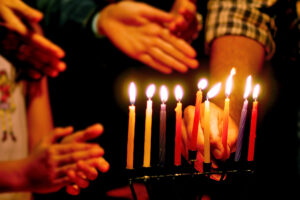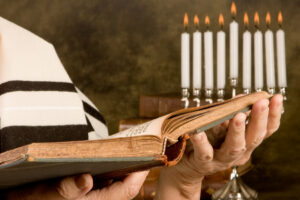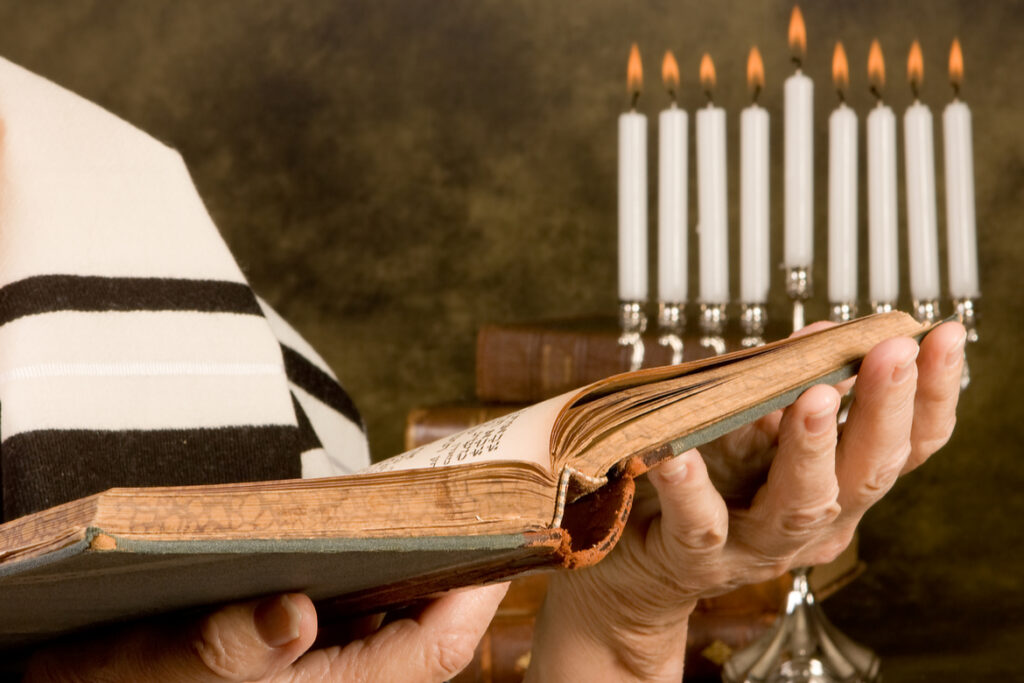…AND ONE’S ENEMIES (PART II)
Our Sages specifically taught: Believe it! Believe that you’ve found some good, even if you can’t see it!
Once, fire swept through a part of Breslov. Passing by the site, Reb Noson and his followers spotted one of the distraught homeowners. Although crying bitterly, he was sifting through the rubble of his destroyed house in the hope of finding something, anything that he might use to rebuild his home. Reb Noson said: Do you see what he’s doing? Even though his house has been destroyed, he hasn’t given up hope. He’s collecting whatever might be useful for rebuilding his house. The same is true when it comes to spirituality. The Evil One fights against us, he tries to destroy whatever holiness we’ve built up by getting us to do something which goes against God’s will. Even so, when we are knocked down and all seems hopeless, we must never give up hope. We have to pick up a few good points and collect them together from amidst the sins. This is the way to return to God (Kokhavey Or p. 78).
* * *
Rebbe Nachman teaches: A person should interpret the verses of the Psalms as regards himself. He should see the words as applying specifically to him and his situation. In connection with this, someone once asked the Rebbe how it was possible to apply all the verses. “What about where King David praises himself, as when he said, “God, guard my soul for I am a chassid”?” (Psalms 86:2). King David was able to say this about himself, but there was no way this man could honestly say that he could. The Rebbe answered: “A person must judge himself favorably, at all times. Doing this allows the person to be a chassid in at least that one good point. We see this in our daily liturgy. At first we say, ‘Who are we? What is our life? What is our righteousness?’ Then we say, ‘But we are the children of Avraham, Yitzchak and Yaakov…’ Thus we praise ourselves and find some good points about ourselves. And this brings us to serve God!” (Likutey Moharan II, 125).
Even so, when we are knocked down and all seems hopeless, we must never give up hope. We have to pick up a few good points and collect them together from amidst the sins. This is the way to return to God…
Someone once came to Rebbe Nachman, complaining about how bitter his life was. This man wanted to draw closer to God and mend his ways, but each time he tried, the temptations grew stronger and stronger. Days turned into weeks and years and he had still not managed to better himself in his devotions to God. The Rebbe tried to encourage him, but to no avail. The man just kept bemoaning his fate. The Rebbe then said to him, “Seeing that all is bad, it’s clear that I have no one to talk to!” At this the man grew excited and said to Rebbe Nachman, “But I do try! I do make attempts to change myself. I’m not totally bad.” Hearing this, the Rebbe said to him, “Aha! Now make use of the lesson AZAMRA! Use your good points to inspire you.
It was Rebbe Nachman’s intention that the person himself say that all was not lost; that he still had a desire to change his ways. Feeling distant from God, a man begins to think that he might never succeed. By challenging all men in the same way he challenged this man, the Rebbe forces us to acknowledge that we do have good points. Once this is established, we are capable of going forward (Tzaddik #569).
* * *
Our Sages advised: Every person must say that the world was only created for me (Sanhedrin 37a). What does that mean? It means that every person is important and especially you. It’s true. You come first. The world was created for you. The only thing is, as Rebbe Nachman explains, this privilege carries responsibility. Because the world was created for me, I must see to its rectification. I am responsible for the world (Likutey Moharan I, 5:1).

Rebbe Nachman stressed, “No matter what has happened, no matter how far you’ve strayed, never despair!”…
Reb Noson not only studied Rebbe Nachman’s teachings, he lived them. Finding the good points is a theme which appears again and again throughout his discourses in Likutey Halakhot. He translates the lesson AZAMRA! into practical guidance for better relationships with family, friends and neighbors – and indeed with whomever we come into contact. Imagine, a majority of all arguments in the home – the most common and often the most harmful form of disagreement – would be eliminated instantly if only we could get ourselves to see the good points and focus only on the positive qualities in our spouses and children.
Rebbe Nachman stressed: “Never despair!” (Likutey Moharan II, 78). No matter what has happened, no matter how far you’ve strayed, never despair! Reb Noson adds: You can always find ways to return to God. If you have started, continue. If you haven’t yet started to serve God, start now! (Likutey Halakhot, Masa U’Matan 4:16).
Reb Noson recognized our need for finding hitchazkut (support and encouragement). Yet, whenever he talks about the support we can draw from others, he inevitably shifts over to the support we must draw from ourselves. In the final analysis, no matter how much encouragement we get from others (the Tzaddik, our family, friends, etc.) it comes down to how much we care about ourselves. Therefore, Reb Noson writes: After all, if you don’t take pity on yourself, who will? (Likutey Halakhot, Netilat Yadayim li’Seudah 6:37).
In addition, Reb Noson writes: Even a drop of good is never lost! Never! Our Sages teach: “If you’ve searched and succeeded in finding, believe it” (Megillah 6b). Why, believe it? If I’ve found, then I know it. What’s the point in believing? But, this is the point. No matter how much you seek the good, you may think you haven’t yet achieved or attained any. You might feel yourself even more distant from your goal than you were before you started. With this in mind, our Sages specifically taught: believe it! Believe that you’ve found some good, even if you can’t see it! (Likutey Halakhot, Birkhat HaPeirot 5:1,2).
Reb Noson also illustrates how we can come to see that good, and in the process discover that we have even more good than we think. Whenever we lose something important, something that we need immediately, we’ll go looking for it. We’ll search high and low, and eventually we’ll find it. What often happens in the course of the search is that we come across other “lost” items, things we’d “forgotten” about and didn’t remember that we still had. It is the same for the person who is always looking for his really good points in Judaism. In the course of his search, he will inevitably come across other “long lost” tidbits that are his. His alone. Much to his surprise, he will find that he has a lot of “little good qualities” within him (Likutey Halakhot, Birkhot HaPeirot 5:4).
(taken from the book: Crossing the Narrow Bridge: A Practical Guide to Rebbe Nachman’s Teachings, chapter 3, pp. 41-44)
- 0 comment






















